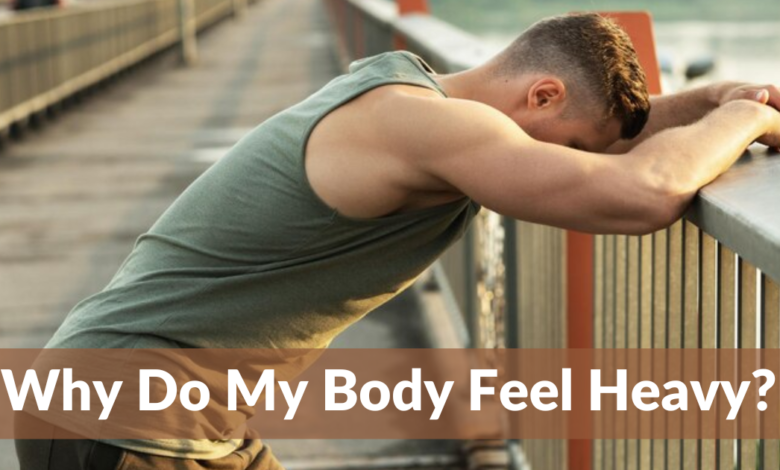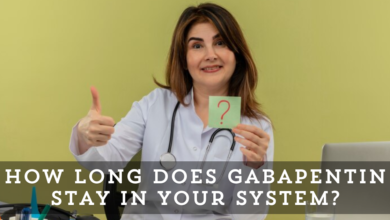Why Do My Body Feel Heavy? The Truth Behind

Feeling heavy in your body can be a perplexing experience, leaving you wondering about the root causes. Understanding why your body feel heavy, whether it is a brief experience or a recurring one, is critical for properly dealing with it.
What is Tiredness, Exhaustion, or Fatigue?
Tiredness, exhaustion, or tiredness are all phrases used to describe a state of physical or mental exhaustion and a lack of energy. Tiredness causes people to feel spent and may make it difficult to do duties efficiently. This could be due to many factors, including a lack of sleep, overexertion, physical disease, emotional stress, or certain medical disorders.
Fatigue can present differently in each person, ranging from minor to severe, and can impair their ability to focus, make decisions, or participate in everyday activities. Address fatigue promptly to prevent long-term harm to your overall health and well-being. Early intervention is crucial for your vitality.

What Can Cause Your Body To Feel Heavy?
1. Physical Exertion and Muscle Fatigue
One of the most common causes of feeling heavy is physical activity and muscle exhaustion. When you engage in strenuous activities or workouts, your muscles become stressed and fatigued, resulting in a feeling of heaviness. This feeling is especially strong after strenuous exercise or lengthy physical exertion.
To relieve this heaviness, it is critical to have enough rest and recovery. Taking breaks during heavy activity, maintaining hydrated, and integrating stretching exercises will help relieve muscle weariness and the sensation of heaviness.
2. Poor Posture
Poor posture and underlying musculoskeletal disorders are also key contributors to feel your body heavy. Maintaining poor posture over time can strain muscles and joints, resulting in discomfort and weight, particularly in the back, neck, and shoulders.
Addressing bad posture necessitates intentional effort and corrective actions. Ergonomic modifications to your workstation, such as the use of ergonomic chairs and desks, can help you maintain good posture. Also, including exercises to build core strength and improve flexibility can ease muscle issues and reduce feelings of fatigue.
3. Dehydration
Dehydration and electrolyte imbalance can also cause the feeling of heaviness in the body. When you’re dehydrated, your body’s fluid equilibrium is upset, causing weariness, muscle weakness, and a sense of heaviness, especially in the limbs.
To avoid dehydration and electrolyte imbalance, drink plenty of water throughout the day. Consuming electrolyte-rich foods and beverages, such as sports drinks or electrolyte-enhanced water, can also aid in the restoration of electrolyte balance and ease feelings of heaviness.
4. Poor Sleep Quality
Quality sleep is critical to overall health and well-being. When your sleep patterns are disrupted or you do not receive enough rest, your body may feel fatigued and heavy. Poor sleep quality can have an impact on hormone levels, metabolism, and cognitive function, all of which contribute to feelings of lethargy.
5. Circulation and Vascular Issues
Poor circulation and vascular disorders may lead to feel your body heavy, especially in the legs. Varicose veins, deep vein thrombosis (DVT), and peripheral artery disease (PAD) can all restrict blood flow, causing blood to pool in the legs and feel heavy and swollen.
Lifestyle changes and medication procedures may be required to enhance circulation and relieve the sensation of heaviness caused by vascular problems. Raising legs, wearing compression socks, and exercising regularly can help improve blood flow and ease discomfort. In severe circumstances, medical procedures such as vein ablation or vascular surgery may be prescribed.
6. Stress and Anxiety
Stress and emotional problems can also contribute significantly to feel heavy in your body. Chronic stress, worry, and depression can cause muscle tension, weariness, and a sense of heaviness, especially in the chest and shoulders.
Managing stress and addressing emotional well-being is critical for reducing the impression of heaviness caused by psychological causes. Mindfulness meditation, deep breathing techniques, and stress-relieving hobbies can all assist induce relaxation and lessen physical symptoms of stress.
7. Medications and Medical Conditions
Certain medications and underlying medical disorders can also produce a feeling of heaviness in the body as a side effect or symptom. Antihistamines, antidepressants, and muscle relaxants may cause feelings of weariness and heaviness.
Furthermore, physical illnesses like hypothyroidism, chronic fatigue syndrome, and fibromyalgia can cause feelings of heaviness and exhaustion. If you feel that your symptoms are caused by pharmaceutical side effects or underlying medical disorders, you should visit a healthcare expert.

Medical Conditions Associated with Feeling Heavy
1. Hypothyroidism
Hypothyroidism is a condition caused by an underactive thyroid gland that does not produce enough thyroid hormones to regulate the body’s metabolism.
One common symptom of hypothyroidism is a continuous feeling of heaviness, which is frequently accompanied by fatigue, weight gain, dry skin, and cold intolerance. The slower metabolism associated with hypothyroidism can cause feelings of sluggishness and fatigue.
2. Fibromyalgia
Fibromyalgia is a chronic pain illness that causes widespread musculoskeletal pain, tiredness, and tenderness in specific trigger points across the body.
Its patients frequently complain of muscle heaviness or stiffness, as well as other symptoms such as sleep disruptions, cognitive difficulties, and mood swings.
3. Chronic Fatigue Syndrome (CFS)
Chronic exhaustion Syndrome, commonly known as myalgic encephalomyelitis (ME/CFS), is a complicated condition characterized by severe exhaustion that lasts for six months or more and is not relieved by rest.
In addition to significant exhaustion, people with CFS may experience muscle pain, cognitive impairment, post-exertional malaise, and unrefreshing sleep. Individuals with CFS frequently report feeling heavy in their bodies.
4. Anemia
Anemia is a disorder characterized by a lack of red blood cells or hemoglobin in the blood, which reduces oxygen delivery to tissues and organs. Symptoms of anemia can vary depending on the underlying cause, but common ones include fatigue, weakness, shortness of breath, dizziness, and palpitations. To feel heavy in the body may be caused by diminished oxygenation of muscles and tissues.

Can You Make Your Body Feel Less Heavy?
Fortunately, there are several simple strategies you can incorporate into your daily life to help you feel less heavy in your body:
- Stay hydrated: Drinking plenty of water can help lessen sensations of heaviness by promoting digestion and enhancing general body function.
- Practice good posture: Maintaining good posture helps reduce pressure on your muscles and joints, giving you a lighter sensation overall.
- Regular Exercise: Regular exercise can improve circulation, strengthen muscles, and enhance energy levels, all of which can help you feel lighter and more agile.
- Stretching: Including stretching exercises in your daily routine can help relieve muscle tension and improve flexibility, resulting in a lighter sense in your body.
- Eat a well-balanced diet: A diet high in fruits, vegetables, lean proteins, and whole grains can supply necessary nutrients that promote general health and vigor, lowering feelings of sluggishness and weight.
- Get enough sleep: Adequate sleep is essential for sustaining good physical and mental health. Aim for 7-9 hours of sleep each night to feel refreshed and energized throughout the day.
- Practice mindfulness or meditation: Techniques like mindfulness meditation can help reduce stress and promote relaxation, reducing sensations of heaviness in the body.
More to Read: Why Do My Arms Hurt When I Sneeze?
Takeaways
Feel heavy in the body can be a difficult experience, but addressing the underlying causes is critical for successful symptom relief. There are a variety of solutions available to help you feel lighter and more energized, such as improving your sleep quality, controlling stress, eating a balanced diet, or obtaining professional treatment.
Frequently Asked Questions
Why does my body feel heavy when I wake up in the morning?
Sleep helps our bodies to relax, allowing muscles and bones to gradually wake up. This may feel like hauling potatoes, but it is only the body waking up.
Why does my body feel heavy after eating a big meal?
Imagine your stomach as a balloon that has just been filled with air (or food in this example!). When you consume a large meal, your stomach expands and feels heavy. It’s like carrying a large bag of groceries! Your body needs time to digest all of that delicious food, so it’s normal to feel a little heavy afterward.
Why does my body feel heavy when I’m tired?
Tiredness makes our bodies feel heavy and sluggish, like a tired engine running out of fuel. Rest is required for our bodies to recharge, just as a car requires gas to continue operating.
Why does my body feel heavy when I’m sick?
During illness, our bodies fight pathogens and intruders, which makes us feel heavy and feeble. This is our body’s way of reminding us to rest and let it do its work.
Why does my body feel heavy after exercising?
After exercise, muscles feel fatigued and tight, as if rubber bands have been stretched and gripped. This is a natural recuperation time, during which the body can strengthen and recuperate without feeling like a noodle.





of course like your website but you have to check the spelling on several of your posts A number of them are rife with spelling issues and I in finding it very troublesome to inform the reality on the other hand I will certainly come back again
I don’t think the title of your article matches the content lol. Just kidding, mainly because I had some doubts after reading the article.